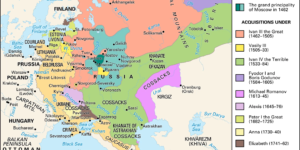Climate Change: The Mother Of All Geopolitical Challenges ~ Interview With Graciela Chichilnisky
1 Comment In this interview, Graciela Chichilnisky, a world leading economist and one of the major climate change forces in our era, talks about the reality of climate change science, the reasons why some corporate interests continue to deny the facts about it, and explains why climate change may represent the greatest geopolitical challenge facing humanity.
In this interview, Graciela Chichilnisky, a world leading economist and one of the major climate change forces in our era, talks about the reality of climate change science, the reasons why some corporate interests continue to deny the facts about it, and explains why climate change may represent the greatest geopolitical challenge facing humanity.
Marcus Rolle: Despite the international scientific community’s consensus on climate change, there are still people who deny that climate change exists or that it is caused by human activity. In fact, some of those naysayers have been funded by corporate interests such as ExxonMobil, as revealed by Exxon’s former in-houses climate change expert Lenny Bernstein. However, the evidence for global warming is overwhelming. Why, specifically, are some corporate interests bent on hiding the truth about climate change, and what’s your opinion on the effects of global warming?
Graciela Chichilnisky: Some of the naysayers have been funded by corporate interests as was revealed by Lenny Bernstein, the in-house climate change expert of Exxon. Lenny fought me tooth and nail in Kyoto during December 1997, while I designed and then wrote the Carbon Market into the United Nations Kyoto Protocol. At the end the carbon market prevailed and is now international law, and ironically it is now advocated by six of the largest oil companies in the world and this includes ExxonMobil.
Corporate interests are far reaching and they can permeate the entire economy and the politics of a nation as a whole. In the case of fossil fuels the situation is compounded by the central role played by energy in the economy. Fossil fuels are all about energy, and energy is the mother of all markets. Everything is made with energy, your home, your car, your food and the computer on which this article is written and read. For this reason the right to use fossil fuels is very basic and it is close to land’s rights; as land’s rights, the rights to fossil fuels can be the cause of wars. It is all about values. Some say that the right to fossil fuels is about the right to use the earth’s resources, which were provided by God to humans, and they hold this as a human right whether or not burning fossil fuels can cause catastrophes and damage irrevocably the rest of the world.
Tackling climate change is like abolishing slavery. It is so deeply felt that it can cause wars. 150 years ago it was nearly obvious to everybody that slavery must disappear, because of basic human principles and of the most sophisticated arguments about freedom, civil rights and even economics. Yet 150 years ago the US fought a fratricide war that was the bloodiest in the nations’ history, and tore the nation apart to defend the right to own slaves. The South lost, but it nevertheless attempted to resuscitate the war many times despite that.
US historians say that the economic value that is at stake from abolishing fossil fuels is about the same as the value that was involved in eliminating slavery in the US 150 years ago. The abolition of fossil fuels can destroy today the largest balance sheets in the planet: these are the balance sheets of the largest oil companies. It is not surprising that emotions and economic interests of that size run amok and cloud reason.
MR: You have said that climate change is the mother of all geopolitical challenges. Can you elaborate a bit on this?
GC: Climate change is all about the use of fossil fuels: over two thirds of the world’s CO2 emissions that cause climate change come from burning fossil fuels to produce energy. Fossil fuel energy is today the basis of industrialization, and its use since WWII is what is causing climate change. The period since WWII is when the world economy globalized, where the North and the South wealth gap increased deeply and became three times larger what it was before, when abject poverty led over 1.3 billion people to live below the level of satisfaction of basic needs, and on the brink of survival. The Bretton Woods institutions were created after WWII: the IMF, the World Bank, the WTO, and they were dominated by the US that become nearly 60% of the world economy after the destruction of Germany and Japan. The Bretton Woods institutions used financial tools, denominated in US dollars, to encourage and coerce 80% of the planet’s population in the developing nations to follow a resource intensive form of economic development, leading to the over-extraction and exports of their fossil fuel resources and other important natural resources at the lowest prices ever – except perhaps for the prices we face today –and their overuse in rich nations. Fossil fuels are intimately connected with globalization – indeed they are the basis of the current wave of globalization. Fossil fuels are the basis of industrialization and they are traded through international markets: the international markets are dominated by rich nations, and these markets grew three times faster than the world economy as a whole since WWII. In these markets, poor nations that house 80% of the world population over-extract the earth’s resources within their territory for exports, and export them at prices that are lower than replacement costs, leading to sustained poverty, while rich nations who house 20% of the world’s population overuse the world’s resources and benefit from them at very low prices. This implacable process has led to a 3x increase in the world’s wealth gap between the poor South and the rich North since WWII. The image is just 20% of the world’s population siphoning and overusing the great majority of world’s resources. But the process has reached its natural limits: the increasing inequality between rich and poor nations in the world economy and the corresponding overexploitation of resources is the cause of the global environmental crisis of our times. It is threatening every nation in the world. Global environmental risks are worst for the poor nations, but every nation is at risk from the massive overuse of resources our lopsided economies and international trade policies of the Bretton Woods institutions caused. Climate change means the rise of the seas which has the same level all over the world. While the poor will suffer more, rich nations will suffer $trillions in economic losses, according to OECD reports in Paris, and will face massive immigration flows that will threaten their institutions, as the Pentagon anticipates.
The geopolitical risks of climate change are now becoming evident: they include massive migration caused by extreme climate conditions entailed in climate change. Record droughts and floods are the most immediate consequence of climate change. Not surprisingly, the current war in Syria started after four years of extreme droughts that left people without jobs, without food and without hope. The result is a massive exodus into Europe – just one million people last year, with several more millions expected this year and the next. This developments is highly destabilizing. It leads to political fear and hate against the massive wave of immigrants. The fear of immigrants and refugees has become an everyday reality, with immigrants being demonized by the media and presidential candidates in Europe and the US alike. The fear is that immigrants will take away jobs, reshape the face of contemporary society, and be a source of violence and even terrorism. The fear of immigrants and refugees can cause nationalistic and even fascist tendencies, and provide the pretext for the emergence of authoritarian regimes in many advanced democratic nations in the world. In due time, such political scenarios can provide the source for the destruction of democratic institutions and the end of freedoms and liberties that took centuries to build and the excuse for the implementation of extreme political measures against minorities. In fact, they may lead to the reformulation of human civilized values as we know them. The ensuing political chaos can destroy civil societies even before the rising seas that are caused by the melting of the North and the South Poles swallow hundreds of millions of people and create global demographic chaos. This in a nutshell is why climate change is the mother of geopolitical changes today.
If this position seems extreme, consider that it is similar in many aspects to the position that the Pentagon itself has presented in official reports on the topic of climate change and national security risk during the last 8 years.
Why don’t we hear more about this in today’s political climate? Contemporary civil discourse avoids these issues because nobody seems to know what to do about it. It is a form of socio-psychological denial. Yet there are now technology solutions in the US that can resolve the problem and lead to a massive restructuring of our energy infrastructure. Such technologies and new infrastructure can also lead to economic boom. The main issue is redressing the economic and human value of a clean atmosphere, and of the survival of the human species. Despite the existence of solutions, enormous change in the foundations of energy use and even capitalism as we know it, are very difficult to accept. Short term interests are key factors that stand on the way to clear reason.
MR: The latest attempt on the part of the so-called international community to tackle the climate change challenge took place in Paris in November-December 2015. What’s your assessment of the climate agreement at COP21?
GC: The Paris COP21 climate conference has produced an agreement that has been hailed by world leaders as a development signifying “a turning point for the world,” the end of the fossil fuel era. The truth of the matter, however, is very different. The Paris COP21 climate agreement is simply empty of action, and can be called hot air. We are no closer to averting a catastrophic climate change scenario than we were before the start of the Paris talks. In fact, this could be the biggest failure of the global climate negotiations in their 21 years of existence. It’s an agreement that binds the signatories to nothing. My former colleague at Columbia University and from NASA, Professor James Hansen, a founding figure in identifying the risks of climate change, says the Paris agreement is “fraud.” We spent billions of dollars and weeks of talks in Paris with no action items to show for it. Climate change is a tough problem that cannot be resolved by wishful thinking. Voluntary solutions never worked. We have 18 years of experience to prove this fact.
The so-called Paris agreement also makes no commitment to funding. Yet, funds are needed to transform the $55 trillion power plant infrastructure that emits 45% of the global emissions. There can be no solution to the climate change challenge without transforming the very infrastructure that is responsible for nearly half of the global emissions. The power plants upon which this infrastructure is based on operate through the use of fossil fuels and we need to move in the direction of clean power. This will also not happen through wishful thinking. Transforming the $55 trillion power plant infrastructure requires solid financial targets and actions. It is an extremely difficult to do, but it can be done – indeed we now have the financial political and technological solution to resolve climate change – but it cannot happen merely by wishful thinking. Magical thinking will debilitate us and undermine our ability to succeed. And what is at stake here is nothing short of the survival of human civilization as we know it.
MR: Some developing nations are concerned about restrictions on greenhouse gas emissions as they feel that such measures will hinder their own economic development. In fact, they object to western moralizing about climate change since it has been the great western capitalist powers that have caused the problem of climate change. What will it take for developing nations to adopt clean energy power systems?
GC: It is possible with today’s proven technologies to capture of CO2 directly from the atmosphere and at a very low cost – this is called direct air capture (DAC) technology. The CO2 can be utilized in valuable products to reduce costs. With this carbon negative technology™ one can build “carbon negative power plants”™ that produce energy while they clean the planet’s atmosphere. These power plants can produce CO2 in a profitable manner, so the final product is more development with a cleaner atmosphere. In 2009 during COP15 in Copenhagen I created these technology concepts and the Green Power Fund a $200Bn/year fund to build such carbon negative plants in developing nations, which would derive funds ($200Bn/year) from the carbon market of the Kyoto Protocol (which was then trading over $175Bn/year). These plants can provide clean power to poor nations and suffice to build enough carbon negative power plants to clean the world’s atmosphere and to promote enormous and much needed economic development in Africa, Latin America and the Small Island States. These nations can grow and they can clean the planet’s atmosphere at the same time.
In Copenhagen COP15 I presented my plan to the US delegation, and the US State Department announced two days later a version of it in Copenhagen. This version was called a Green Climate Fund (one word was changed) and is now international law. But as its name indicates, the changes built into the new version – the Green Climate Fund – destroyed the connection with power plants that are the source of the problem, and the possible solution, and the connection to the carbon market of the Kyoto Protocol (this was because the US has been against the Kyoto Protocol since Lenny Bernstein of Exxon and other lobbyist in the US had their way).
The Green Climate Fund is now international law but it is handicapped by having no source of reliable funding, while its mother the Green Power Fund that I created had the UN carbon market to fund it, and the carbon market had enough resources to pay for the Fund’s $200Bn/year. As a result of these disconnects, the new Green Climate Fund has never taken off. Despite good willing donations, it has no reliable source of funding and no clear objective beyond alleviating the worst outcomes of the climate change catastrophe.
We need to go back to the Green Power Fund because it can avert climate change altogether. On that financial basis we can now resolve climate change, using the new carbon negative technologies to build carbon negative power plants in the poor nations. It will take 15-20 years to overcome the worst part of the problem and it will cost US$2-3trillion to build as many carbon negative power plants as needed, but every cent can be recovered since carbon negative power plants are commercially viable, namely they pay for themselves: they cost less to build than the revenue they produce from the sale of the CO2.
This is a revolutionary transformation of the global political economy of the last two hundred years, including the dynamic that guides this century’s globalization processes based on the extreme overexploitation of earth’s resources – including the planet’s atmosphere. But one must remember that that this plan needs new types of economic arrangements to succeed. It entails a transformation of capitalism.
Scientific computations show that all this can be self – financed: the CO2 captured from the atmosphere can be sold for use in food and beverages, fertilizers, greenhouses, enhanced oil recovery where appropriate, for clean fuels, building materials, fertilizers, carbon fibers, and more – there is a $1trillion market for CO2 on earth, and these products can eventually utilize and remove enough CO2 to eliminate the 38 gigatons of CO2 that humans put up every year into the atmosphere.
It this plan seems extreme, consider that it is what the Intergovernmental Panel on Climate Change says is needed now in order to avert catastrophic climate change.
MR: Are thresholds on greenhouse gas emissions sufficient at this stage in the game to prevent a catastrophic climate change scenario?
GC: No, the Paris Agreement has no thresholds, none. It has been said to have “no teeth” for this reason. The Kyoto Protocol mandatory emissions/ limits are the only thresholds we have, that we ever had, and they expire in 2020. We need to renew and extend the Kyoto Protocol thresholds as a matter of urgency and implement the carbon negative technologies that the IPCC requires, which are available and even profitable for removing carbon from the atmosphere. We must extend the Green Climate Fund to become the Green Power Fund to help development in the poor nations, mainly China and India – and we must do this now. Time is of the essence.
MR: What type of strategies and tactics could activists and communities pursue to respond to the climate change challenge?
GC: This is a very important issue that requires immediate attention and political action. Once the solutions that are available become communicated and are well understood, the peoples of the world can help organize the actions needed through the UN COP meetings every year, and through communities, local and national organisms that can implement them. Political action is required. This is what democracy is all about.
This will happen once the solutions are better known. They entail carbon negative technology that removes the existing carbon from the atmosphere – as explained above and as indicated in the 5th Assessment Report — in order to avert catastrophic climate change.
But technology isn’t magic. It does not occur in a vacuum. It will develop within appropriate socio-economic structures, within appropriate political and institutional facilities. Here is a good practical example: After World War II, the leading economies created the Bretton Woods institutions to replace war by trade, so that the human species did not spend itself in increasingly savage and destructive world wars. The Bretton Woods institutions were deliberately created to implement change. They succeeded, but had unexpected consequences: they cauased an enormous expansion of international trade and industrialization that created a lopsided world in which the rich nations that house only 20% of the human population consume most of the planet’s resources and are now destroying the atmosphere, its bodies of water, and the complex web of species that constitutes life on earth.
The Bretton Woods institutions were the first global financial institutions created by humans, and they changed the world economy as they were meant to do. They were the brainchild of John Maynard Keynes but they were led by the USA, the largest economy in the world after WWII. The Bretton Woods institutions succeeded to such an extent that they led to the Anthropocene, a new geological period that overcame the Holocene, when humans are now the stronger geological force in the planet.
But we are now facing new, formidable challenges that carry far greater risks that the early postwar era. We need, therefore, to create new global institutions that provide a new view and radically new processes of economic progress, based on a harmonious relationship between humans and nature. The next transformation of the world economy requires new economic arrangements that re-value the earth’s resources that we are destroying at an alarming and unprecedented rate. In addition to the global carbon market, that was created in 1997 and international law since 2005, we now need global limits in the use of water and biodiversity and economic arrangements that provide value for water and for biodiversity. Air, water and food are three basic needs without which humans cannot survive. Yet today clean air, clean water and biodiversity have no economic value. The global markets I propose for carbon, water and biodiversity will make these the largest economic assets in the world, as they should be. It can be seen that these environmental assets are mostly in developing nations, which house the world’s largest environmental richesses. Because the atmosphere, the bodies of water and the world’s biodiversity are global public goods, once we alter their use, the arrangements to use them will be completely different from the markets for private goods that we have today. For example, they would require more equity in order to achieve efficiency. These new global economic arrangements will transcend actually existing capitalism and will create a new economy in which the most important assets are the world’s resources, equity is a foundational value, and equity as well as efficiency are closely linked, as they should.
Is this a dream or can this happen? If there is a future to human civilization it must happen, and it will happen. In a way it is already happening. The new generations know this and will rise to the occasion once we provide the awareness and the tools to build a new economic order that is actually attainable.
Welcome to the world of the future.
—
Graciela Chichilnisky has published scores of books, including Saving Kyoto, and some 350 scientific articles in the world’s most prestigious economics and mathematics journals. The Washington Post calls her an “A-list star” and Time Magazine a “Hero of the environment”. In addition, Chichilnisky has made revolutionary contributions to the world economy – like creating the concept of Basic Needs and the UN Carbon Market.
You May Also Like
Comments
One Response to “Climate Change: The Mother Of All Geopolitical Challenges ~ Interview With Graciela Chichilnisky”
Leave a Reply









March 26th, 2016 @ 2:06 pm
Amazing interview. Let’s hope the world pays attention to the calls for action by scholars such as Graciela Chichilinsky.